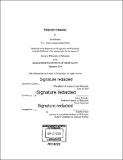| dc.contributor.advisor | Robert Stalnaker. | en_US |
| dc.contributor.author | Boylan, David (David Henry) | en_US |
| dc.contributor.other | Massachusetts Institute of Technology. Department of Linguistics and Philosophy. | en_US |
| dc.date.accessioned | 2019-03-01T19:56:48Z | |
| dc.date.available | 2019-03-01T19:56:48Z | |
| dc.date.copyright | 2018 | en_US |
| dc.date.issued | 2018 | en_US |
| dc.identifier.uri | http://hdl.handle.net/1721.1/120670 | |
| dc.description | Thesis: Ph. D. in Linguistics, Massachusetts Institute of Technology, Department of Linguistics and Philosophy, 2018. | en_US |
| dc.description | Cataloged from PDF version of thesis. | en_US |
| dc.description | Includes bibliographical references (pages 99-104). | en_US |
| dc.description.abstract | This dissertation focuses on subjective or epistemic readings of the modals 'might' and 'should' and considers how they fit into broader theories of modal vocabulary. Chapter 1, 'What the Future "Might" Brings', develops a puzzle about epistemic modals and tense, showing that future tensed epistemic modals are surprisingly marked in cases of predictable forgetting. It gives a solution whereupon epistemic modals are monotonic: their domains only shrink going forward in time. It is noted that this property is also a feature of circumstantial modals and a new general picture of how epistemic and historical modality are related is proposed. Chapter 2, 'Putting "Ought"s Together', argues that deontic but not epistemic 'ought's appear to obey the inference pattern Agglomeration. It gives a new semantics for 'ought', where it is an existential quantifier over best propositions, and shows how this semantics together with pragmatic features of deontic contexts can explain the differing inferential properties of deontics and epistemics. Chapter 3, 'More Miners', generalises the now infamous miners problem to epistemic 'ought's. It shows that conservative non-probabilistic solutions do not extend to epistemic cases with the same structure. It solves the problem using probabilisitic orderings over propositions and draws some morals about the metasemantics of such orderings and the role of neutrality in the semantics of deontic modals. | en_US |
| dc.description.statementofresponsibility | by David Boylan. | en_US |
| dc.format.extent | 104 pages | en_US |
| dc.language.iso | eng | en_US |
| dc.publisher | Massachusetts Institute of Technology | en_US |
| dc.rights | MIT theses are protected by copyright. They may be viewed, downloaded, or printed from this source but further reproduction or distribution in any format is prohibited without written permission. | en_US |
| dc.rights.uri | http://dspace.mit.edu/handle/1721.1/7582 | en_US |
| dc.subject | Linguistics and Philosophy. | en_US |
| dc.title | Subjective modality | en_US |
| dc.type | Thesis | en_US |
| dc.description.degree | Ph. D. in Linguistics | en_US |
| dc.contributor.department | Massachusetts Institute of Technology. Department of Linguistics and Philosophy | |
| dc.identifier.oclc | 1088505005 | en_US |
